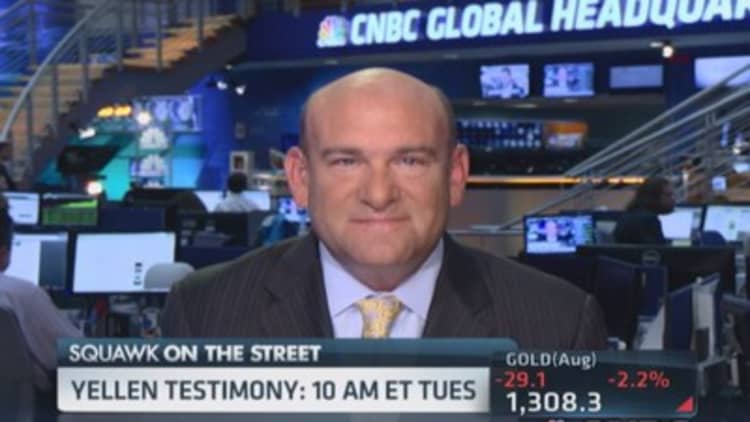Federal Reserve Chair Janet Yellen gave an interview to the New Yorker, and any time such exclusive access is given, the questions go beyond just what was said.
They invariably include whether there are some hidden clues about future policy as the reason for granting the interview at all—and even whether there's some message in the particular outlet that was chosen.
Such was the case in March 2009 when then-Fed chairman Ben Bernanke sat for a rare "60 Minutes" interview with his first term expiring and no nomination pending for a second term. With the Fed enduring withering criticism of its then-novel bond-buying and zero-interest rate policies, it seemed clear that Bernanke chose the outlet best-suited to respond to the broadest audience (and maybe help Bernanke win a second nomination).
So what's Yellen's game in offering the New Yorker interview?
There was little in the way of new policy pronouncements. She put in her own words a key part of the policy statement that the Fed would keep interest rates lower for longer. "…Even when the headwinds have diminished to the point where the economy is finally back on track, and it's where we want it to be, it's still going to require an unusually accommodative monetary policy,'' she said.

The article spends an awful lot of time showing Yellen to be a policy maker concerned with average Americans and the plight of Main Street more than Wall Street. In this sense, it is in line with efforts by Bernanke to respond to a central criticism of the Fed that comes from both right and left.
Read MoreYellen to maintain Keynesian slant: Report
The right lambastes the Fed for interfering with "the natural" operation of free capital markets and the left criticizes the Fed for caring more about financiers than the middle class and the poor. For its part, the Fed believes that its policy of low interest rates is the one most beneficial to the largest number of people.
What we know concerns the Fed the most is political interference in its policy making.
Rep. Jeb Hensarling, R-Texas, recently held hearings on whether Congress should require the central bank to adopt a rule to govern the making of interest-rate policy; Sen. Rand Paul, R-Ky., wants the Fed's making of monetary policy to be subjected to audits, which the Fed argues would put a political chill over decisions. Yellen's interview would then appear to be a response to gathering though not particularly strong political winds that challenge the Fed's independence on monetary policy.
Read MoreFed minutes: QE likely to end in October
Yet another way to think about why she gave the interview is this: If the consensus is right, the Federal Reserve will be ending quantitative easing in October. About six to eight months later, the Fed will affect its first interest rate hike in what will be nine years.
So the Fed is moving toward the hawks.
They can complain (and do) that the Fed is not getting there fast enough and may eventually have to move faster. But they can't complain the Fed isn't going there.
Read MoreWhy traders are wrong about the Fed: Insana
QE has been reduced to $35 billion a month, from $80 billion. With that as a given, the most likely source of Fed criticism will be from the left, which will argue against rate hikes and for less concern about inflation.
In this way, Yellen talking to the New Yorker is a preemptive bid by the Fed to show that Fed policy is concerned with working Americans. It's also an early attempt to address criticism sooner rather than later from what will definitely be a controversial move, when it comes.
—By CNBC's Steve Leisman


